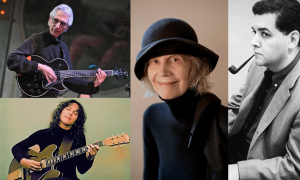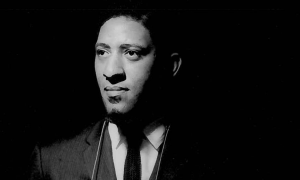Home » Jazz Articles » Highly Opinionated » Craft Recording's "Chet" is a Rare Win for Baker
Craft Recording's "Chet" is a Rare Win for Baker

DonЎҜt let the 'golden-boy of the trumpet turned junkie' mythos blind you to BakerЎҜs considerable talent. Just take another doomed sex symbolЎҜs advice and listen without prejudice.
Charlie Parker
saxophone, alto1920 - 1955

Miles Davis
trumpet1926 - 1991


Chet Baker
trumpet and vocals1929 - 1988

Charlie Parker
saxophone, alto1920 - 1955
Only Davis, of course, went on to be a pivotal actor in jazz history and one of the most celebrated and canonized musicians of the twentieth century. Baker, after a burst of fame in the nineteen-fifties, became a relatively marginal figure sustained by name-recognition and nostalgia.
The difference in their reputations might be measured in many ways—by the indexes of jazz history books, for instance, or mentions in reviews and interviews (how many critics or young jazz musicians cite Chet Baker as an influence today?)
It has certainly been apparent in the latest wave of reissue fever, which after the near-death of the compact disc is focused on that resurgent, impractical, and addictive media, the long-playing record. Miles Davis fans have been treated to excellent issues of his fifties Columbia masterpieces in reasonably priced editions (the mono Sketches of Spain and Kind of Blue are among the best audiophile bargains in jazz), deluxe 45 rpm versions from Mobile Fidelity of the second great quintet's complete studio oeuvre (each album costs $50 or more—greatness has a price) and various one-offs (Analogue Productions' issue of Seven Steps to Heaven sounds so celestial it almost convinces the listener that the album is great, instead of merely very good).
Chet Baker's albums have received little such attention. In part, this is because they are wildly inconsistent. Davis was one of the greatest bandleaders and conceptualists in jazz, with an incredible run of "above-average" to "great" to "masterpiece" recordings, year after year. (It didn't hurt that the majority of his output was released on Columbia, a label with large resources, fine studios, and talented producers). Baker, for his part, recorded, let us say... promiscuously. Any label that made a reasonable offer could enjoy his services, and he was not fastidious about backing musicians (he was a single, not a bandleader) or aesthetic concepts. Davis, with his motto of constant experimentation and change, did his best to make each album an event. Baker, one suspects, treated most of his recording sessions as a source of income to get another fix.
So it is surprising that Craft Recordings treats Baker's work as well as it does with its box set Chet—a collection of the four album Baker cut for Riverside Records with a bonus disc of alternate and out takes. Craft seems to be learning as it goes with its reissue efforts. Its massive box of Coltrane's 1958 Prestige sides was cut from digital masters, as was its box of Miles' "first-great quintet" Prestige session. Both are bound like books, which in the case of the eight-disc Coltrane collection must have induced a few hernias.
Meanwhile, Chet is all analog (aside from the bonus disc) and the sound benefits accordingly. The clarity and presence on these recordings is far superior to CD issues, with the bass especially benefiting from the careful—and quiet—transfers on offer. The jackets are heavy-weight and glossy. The box—well, it's sturdy, nicely textured, and, like most slip-cases for sets of individual LP's, supremely pointless. All and all, Chet makes the best argument possible for the worth of modern reissues on the less-than-modern, highly seductive, vinyl format.
All that attention to detail, however, is of little use if the music is not up to par. Unfortunately, along with the sonic delights on offer, Chet, from time to time, vividly illustrates what happens when a feckless musician encounters an unsympathetic producer.
Producer and half-owner of Riverside Records Orrin Keepnews had to keep one eye on commerce, and his presentation of even great artists like

Bill Evans
piano1929 - 1980

Thelonious Monk
piano1917 - 1982
 Baker debuted on Riverside with a vocal album titled It Could Happen to You. Keepnews was not fond of Baker's singing and seems to have packaged the effort accordingly. In an era littered with design disasters and pointlessly exploitative nudes, the cover makes a plausible stab at being the single most fatuous photograph ever used to shill a jazz LP. Baker's turtleneck seems to have deployed like an airbag in a car crash as he stares with an expression delicately poised between predation and confusion at a woman too uncomfortably "happy" to even look back at him. It's unclear if the star-crossed couple pose in a bean bag chair or modernist sculpture, or, indeed, if the title of the album is a promise or a threat.
Baker debuted on Riverside with a vocal album titled It Could Happen to You. Keepnews was not fond of Baker's singing and seems to have packaged the effort accordingly. In an era littered with design disasters and pointlessly exploitative nudes, the cover makes a plausible stab at being the single most fatuous photograph ever used to shill a jazz LP. Baker's turtleneck seems to have deployed like an airbag in a car crash as he stares with an expression delicately poised between predation and confusion at a woman too uncomfortably "happy" to even look back at him. It's unclear if the star-crossed couple pose in a bean bag chair or modernist sculpture, or, indeed, if the title of the album is a promise or a threat. Once you have covered your eyes in horror, however, be sure to give the record a spin, as it is one of Baker's strongest collections of vocals on record, with episodes of scatting that seamlessly and painlessly extend his improvisational talents into a new channel. The tunes selected are not obvious warhorses and Baker sings more confidently than he did just a few years earlier on Pacific. No one would claim Baker has range or power as a singer, any more than as a trumpeter, but his style meshes perfectly with his limitations. Careful listening reveals that Baker's detachment—an almost pathological aversion to emotional histrionics—allows him to focus on melodical elaboration and nuance with a clarity quite removed from the raptures he inspired in so many female—and, one suspects, no small number of male -listeners. It is a narrow art, but it is art, not just the coat-tail riding of the many West Coast musicians mimeographing the Birth of the Cool sessions. Whether one cottons to the androgynous cast of Baker's voice is obviously a matter of taste, but surely in this era of supreme wokeness we shouldn't be too shocked by it.
As with all the LPs in this box, the excellent transfer makes the performers more "present" than ever while revealing every choice made by Riverside's engineers. Baker's trumpet and voice are warmly and vividly realized, if a bit too spot-lit. His accompanists, who seem to be playing twenty feet or so behind him, are all accomplished musicians.

Kenny Drew
piano1928 - 1993
George Morrow
bass, acousticb.1925

Sam Jones
bass, acoustic1924 - 1981

Philly Joe Jones
drums1923 - 1985

Dannie Richmond
drums1935 - 1988
 Chet Baker in New York is just what it says on the tin—Baker playing with "East Coast" musicians from Riverside's stable. The personnel is strong if mismatched:
Chet Baker in New York is just what it says on the tin—Baker playing with "East Coast" musicians from Riverside's stable. The personnel is strong if mismatched: 
Al Haig
piano1924 - 1982

Johnny Griffin
saxophone, tenor1928 - 2008

Paul Chambers
bass, acoustic1935 - 1969
The fast tunes work the best. Baker negotiates the changes just fine, but then anyone who heard his work with

Russ Freeman
piano1926 - 2002
Perhaps the most instructive tune, however, is the mid-tempo "Solar," which Miles Davis claimed as his own on a 1954 recording. While the Davis version flows nicely along, the Riverside arrangement includes a stop-start motif that interrupts Baker's imagination, and the tune never achieves liftoff. That said, if you transcribed an average Baker solo from this period and one by Davis, it'd be hard to argue that Davis's—in purely musical terms— was all that more profound. Davis is a more compelling player than Baker because he created better contexts to frame himself (to restate—it's one of the greatest bandleaders of all time versus a feckless single) and because Davis projects so much emotion even into his coolest playing. Baker, in contrast, is so cool as to be cold at times, diffident sounding at others. His melodic improvisations, however, are arguably as good as or better than Davis.' Don't let the "golden-boy of the trumpet turned junkie" mythos blind you to Baker's considerable talent. Just take another doomed sex symbol's advice and listen without prejudice.
 Next up, Chet does a better job of presenting Baker the balladeer. The personnel is to die for, with
Next up, Chet does a better job of presenting Baker the balladeer. The personnel is to die for, with 
Bill Evans
piano1929 - 1980

Connie Kay
drums1927 - 1994

Pepper Adams
saxophone, baritone1930 - 1986

Gerry Mulligan
saxophone, baritone1927 - 1996

Herbie Mann
flute1930 - 2003

Kenny Burrell
guitar, electricb.1931
As throughout the box, the vinyl transfer here captures every nuisance of the playing, whether Chet's trumpet (which is more convincingly embedded in the group than on It Could Happen), Mann and Pepper harmonizing in the background, or Chamber's always pointed bass playing. While it's exciting to get any glimpse of Riverside-era Evans, he often turns regressive on "guest" spots and is not at his most compelling here. One can't advise Evans fanatics to listen to this recording just for his contributions. Baker himself is thoughtful and focused, with playing that is often lovely but never particularly emotive. This is a textbook example of a truly "cool" ballad album, like it or leave it. One suspects, from the impassivity of Baker's playing, he doesn't much care which.
 Last and oddest of the official releases, Plays the Best of Lerner and Lowe is a blatant attempt to capture some of the magic generated by
Last and oddest of the official releases, Plays the Best of Lerner and Lowe is a blatant attempt to capture some of the magic generated by 
Shelly Manne
drums1920 - 1984
The line-up here is cluttered. Pepper Adams returns on bari (hooray!), Herbie Mann's back on flute ([redacted]), and Bill Evans tickles the ivories again—for half the tracks. The little-known Bob Corwin fills in on the other numbers, while Earl May and Clifford Jarvis are relatively anonymous presences on bass and drums respectively. If that wasn't enough (and it probably was),

Zoot Sims
saxophone, tenor1925 - 1985

Lester Young
saxophone1909 - 1959

Count Basie
piano1904 - 1984
The project ends up in a limbo between small group and "Birth of the Cool" style tentet, neither fleet as a combo nor committed to its "little big band" arrangements, which come off as cute more than cool. The real problem, however, is the bizarre engineering. The recording bathes Chet's horn in reverb more appropriate to Elvis singing "Heartbreak Hotel" than a jazz session, and dollops it inconsistently on the other horns as fancy dictates. At times the engineer seems to change his mind mid-song, and there are moments where Baker and Pepper seem to be playing from two caverns bracketing an oddly dry-sounding rhythm section. The clarity of the vinyl mastering here ruthlessly exposes these lapses of judgment, and as a result the album works best as background music. Baker does nothing to disgrace himself—it's just an ill-thought-out package framing him. But then that is the story of so many Baker sessions. He seems to have been distracted by other concerns during most of his recording career, and one can't put all the blame on drugs. (Even at his lowest point in the early fifties, one suspects Miles would have clocked anyone suggesting that he record with Herbie Mann...)
 The final disc in the package collects alternate takes appearing on earlier CD issues of the material. It is a sensible choice to quarantine these efforts, though given they are digital transfers it might have been even more sensible to just burn them to a CD or include a download code. Still, compared to Craft Recording's quixotic presentation of Miles Davis' quintet Prestige sessions, this box is a miracle of common sense. One can only hope the approach of issuing albums as originally conceived, in separate jackets, in full analog pressings, replaces Craft's strange predilection for unwieldy "books" of digitally transferred vinyl in session-order. For once, then, Baker's recorded legacy gets better treatment than Miles,' even if one cannot argue the material itself is entirely deserving of it. Now, if someone wants to give this luxury presentation to Baker's best Pacific sessions with Russ Freeman, or his fine Prestige sequence aping Miles' Cookin'/Steamin' series, or even his CTI run... this reviewer for one will be all ears.
The final disc in the package collects alternate takes appearing on earlier CD issues of the material. It is a sensible choice to quarantine these efforts, though given they are digital transfers it might have been even more sensible to just burn them to a CD or include a download code. Still, compared to Craft Recording's quixotic presentation of Miles Davis' quintet Prestige sessions, this box is a miracle of common sense. One can only hope the approach of issuing albums as originally conceived, in separate jackets, in full analog pressings, replaces Craft's strange predilection for unwieldy "books" of digitally transferred vinyl in session-order. For once, then, Baker's recorded legacy gets better treatment than Miles,' even if one cannot argue the material itself is entirely deserving of it. Now, if someone wants to give this luxury presentation to Baker's best Pacific sessions with Russ Freeman, or his fine Prestige sequence aping Miles' Cookin'/Steamin' series, or even his CTI run... this reviewer for one will be all ears. Photo credit: Bobby Willoughby
Tags
Highly Opinionated
Chet Baker
Patrick Burnette
Miles Davis
Charlie Parker
Kenny Drew
George Morrow
Sam Jones
Philly Joe Jones
Dannie Richmond
Al Haig
Johnny Griffin
Paul Chambers
Russ Freeman
Bill Evans
Connie Kay
Pepper Adams
Gerry Mulligan
Herbie Mann
Kenny Burrell
Shelly Manne
Zoot Sims
Lester Young
Count Basie
Chet
Craft Recordings
Comments
PREVIOUS / NEXT
Support All About Jazz
 All About Jazz has been a pillar of jazz since 1995, championing it as an art form and, more importantly, supporting the musicians who make it. Our enduring commitment has made "AAJ" one of the most culturally important websites of its kind, read by hundreds of thousands of fans, musicians and industry figures every month.
All About Jazz has been a pillar of jazz since 1995, championing it as an art form and, more importantly, supporting the musicians who make it. Our enduring commitment has made "AAJ" one of the most culturally important websites of its kind, read by hundreds of thousands of fans, musicians and industry figures every month.





 Buy Now
Buy Now























